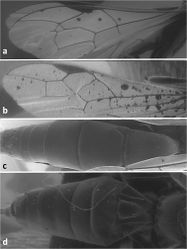Cyanopterus flavator
| Notice: | This page is derived from the original publication listed below, whose author(s) should always be credited. Further contributors may edit and improve the content of this page and, consequently, need to be credited as well (see page history). Any assessment of factual correctness requires a careful review of the original article as well as of subsequent contributions.
If you are uncertain whether your planned contribution is correct or not, we suggest that you use the associated discussion page instead of editing the page directly. This page should be cited as follows (rationale):
Citation formats to copy and paste
BibTeX: @article{Petersen-Silva2012ZooKeys251, RIS/ Endnote: TY - JOUR Wikipedia/ Citizendium: <ref name="Petersen-Silva2012ZooKeys251">{{Citation See also the citation download page at the journal. |
Ordo: Coleoptera
Familia: Cerambycidae
Genus: Cyanopterus
Name
Cyanopterus flavator (Fabricius 1793) – Wikispecies link – Pensoft Profile
Material examined
Portugal: 1 female, “Leiria, 14/6/2011”, “Ensaio Pupas Natural”, “Col. Entomologica, est. Florestal”, “13”; 1 female, same labels, 17.VI.2011, N 12. “Leiria, Larvas Artificial”: 1 female, N 26; 1 female, N 27. “Leiria, Posturas Artificial”: 1 female, 31.VIII.2011, N 25; 1 female, N 27. “Leiria, Ensaio, Posturas Artificial”: 1 male, 31.VIII.2011, N 21. “Vale Feitoso”: 1 female, N 9; 1 female, N 10; 1 male, N 11; 1 female, N 14; 1 female, N 15; 1 female, N 16; 1 female, N 17.
Distribution
Palaearctic: Algeria, Croatia, Cyprus, former Czechoslovakia, Finland, France, Germany, Greece, Hungary, Israel, Italy, Japan, Kazakhstan, Korea, Latvia, Morocco, Netherland, Poland, Romania, Russia, Spain, Switzerland, Syria, Tunisia, Ukraine, United Kingdom, former Yugoslavia (Yu et al. 2005[1]) and Portugal (Naves et al. 2005[2]).
Hosts
Bostrichus capucinus (Linnaeus) (Bostrichidae); Acanthocinus griseus (Fabricius), Acanthoderes clavipes (Schrank), Hesperophanes pallidus (Olivier), Monochamus galloprovincialis (Olivier), Monochamus sartor (Fabricius), Morimus asper (Sulzer), Phymatodes testaceus (Linnaeus), Pogonochaerus fasciculatus (Degeer), Pogonochaerus hispidus (Linnaeus), Rhagium inquisitor (Linnaeus), Saperda scalaris (Linnaeus) (Cerambycidae) (Yu et al. 2005[1]), and Monochamus rosenmulleri (Cederhjelm) (Watanabe 1937[3]).
Biology
The biology of this parasitoid is poorly known, but in this study all the specimens emerged from cocoons from the xylemic galleries of Monochamus galloprovincialis, which were not completely sealed with frass, as it is normal. Considering the length of the ovipositor of Cyanopterus flavator, it is apparent that only first larval instars of Monochamus galloprovincialis (found beneath the bark) are parasitized, which subsequently enter the wood carrying the parasitoid. Only the mandibles of the host larvae were found in galleries with cocoons.
Remark
Monochamus galloprovincialis as a host of Cyanopterus flavator was already recorded by Campadelli and Scaramozzino (1994)[4] for Italy and Naves et al. (2005)[2] for Portugal.
Taxon Treatment
- Petersen-Silva, R; Pujade-Villar, J; Naves, P; Edmundo Sousa, ; Belokobylskij, ; 2012: Parasitoids of Monochamus galloprovincialis (Coleoptera, Cerambycidae), vector of the pine wood nematode, with identification key for the Palaearctic region ZooKeys, 251: 29-48. doi
Other References
- ↑ 1.0 1.1 Yu D, van Achterberg C, Horstmann K (2005) World Ichneumonoidea, Taxonomy, Biology, Morphology and Distribution. Vancouver, Taxapad.
- ↑ 2.0 2.1 Naves P, Kenis M, Sousa E (2005) Parasitoids associated with Monochamus galloprovincialis (Olivier) (Coleoptera: Cerambycidae) within the pine wilt nematode-affected zone in Portugal. Journal of Pest Science 78: 57-62. doi: 10.1007/s10340-004-0068-z
- ↑ Watanabe C (1937) A contribution to the knowledge of the Braconid fauna of the Empire of Japan (Hymenoptera). Journal of the Faculty of Agriculture Hokkaido Imperial University 42 (1): 1-188.
- ↑ Campadelli G, Scaramozzino E (1994) Imenotteri parassitoidi di insetti xilofagi in in Romagna. Bollettino dell’Istituto di Entomologia della Universita degli Studi di Bologna 48: 115–121.
Images
|

